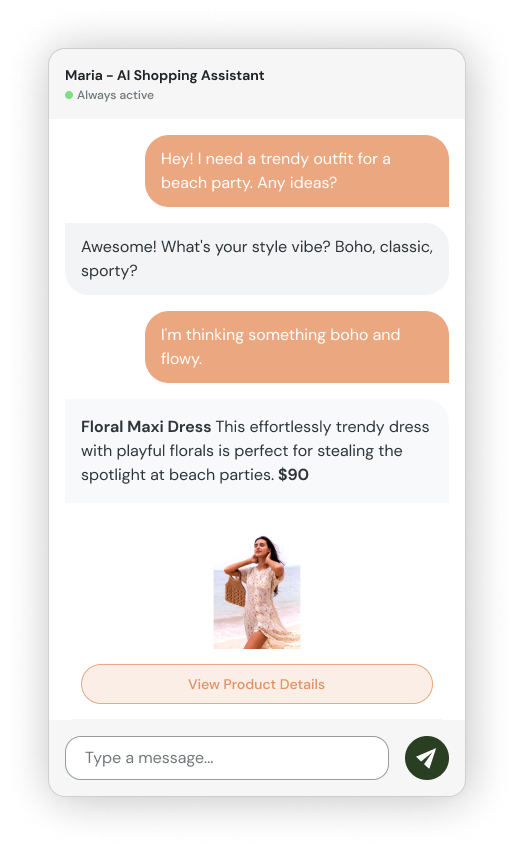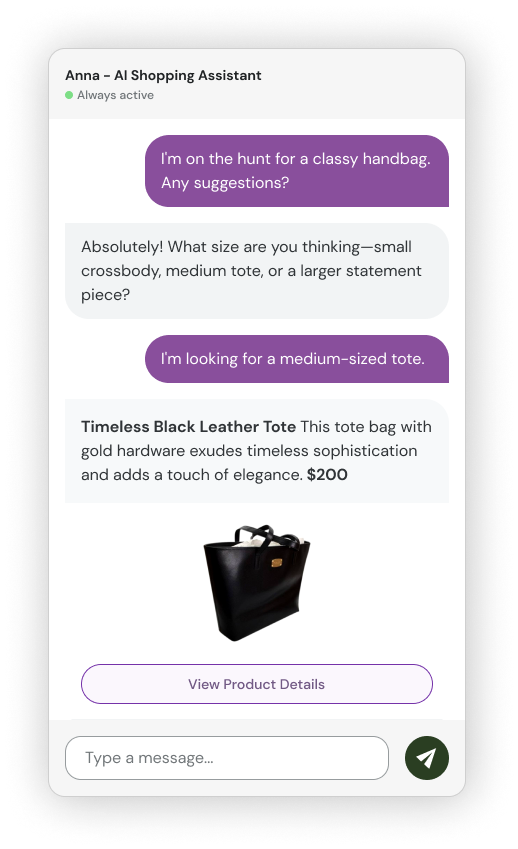Using an AI Shopping Assistant for E-Commerce
Inci Vardar
Just a few years ago, I would have started this article by saying, “Customers no longer wait for days to hear back after sending an email to a brand.” Several months ago, I would say, “Potential customers expect a response to the messages they send to brands on social media within 15 minutes.” In the near future, I will probably write, “Customers don’t waste time and money on brands that do not respond to them immediately.” In fact, there is a certain amount of truth in this sentence even now. Both the advances in e-commerce during the pandemic period and the emergence of AI shopping assistants have irreversibly changed the way we shop online.


The Rise of AI in Online Shopping
Automation technologies have been utilized in our daily operations for quite some time now, spanning from IVR systems to WhatsApp auto-replies. However, a common limitation among these systems was their ability to only provide predefined responses to a finite set of inquiries. Those structures were so rigid that most of the time, they couldn’t even comprehend variations in sentence structure or nuances in language. This all changed with the emergence of modern conversational AI.
Equipped with machine learning algorithms and natural language processing capabilities, the conversational AI can mimic human interactions with remarkable accuracy, adapting to diverse linguistic styles and nuances while maintaining context and coherence. It also continues to learn from each interaction, refining its understanding and responses over time. This proves to be far more useful than merely automating data entry and inventory management and stands as a transformative leap in human-computer interaction. That’s why AI shopping assistants are becoming an integral part of online shopping as they evolve to provide the utmost customer satisfaction.

What Are AI Shopping Assistants?
AI shopping assistants are AI-powered software programs that can interact with customers through human-like conversations across various channels in order to help them proceed with their shopping. They can provide accurate responses to inquiries in real time and improve themselves further by learning from interactions. In addition to engaging prospects with product recommendations, they can integrate different sales techniques into conversations and create personalized experiences for customers.
When defining AI shopping assistants, one of the first tools that come to mind is chatbots. However, the definition expanded to include virtual assistants like Amazon’s Alexa and AI-powered customer service agents who can handle customer inquiries through chat or voice interfaces.
The Technology Behind AI Shopping Assistants
Conversational AI is the foundation of AI shopping assistants. As mentioned before, it is powered by cutting-edge machine-learning algorithms and natural language processing capabilities. Starting from these foundations, AI shopping assistants are trained on extensive information, including product descriptions, specs, and reviews, as well as branding guidelines. By analyzing vast amounts of data, including product information, user preferences, and purchase history, AI shopping assistants create highly personalized shopping experiences and improve the rate of conversions.

The Impact of AI Shopping Assistants on E-Commerce
The most obvious impact of AI shopping assistants on e-commerce is that they improve service quality in a data-driven and cost-effective manner. They can be trained to operate as a digital member of your sales team and extend your service hours to 24/7. But the greatest impact can be explained as “encouraging the customer to make a purchase”. This is achieved through two important pre-sales tasks:
Personalizing the Shopping Experience
The moment a prospect or an existing customer enters your website, the AI shopping assistant starts collecting data. From browsing patterns to past purchase preferences, every interaction feeds the knowledge base of the AI shopping assistant. By analyzing the data and creating an evolving user profile, AI shopping assistants provide personalized recommendations tailored to individual tastes and needs. In addition to suggesting products that the customer may be interested in, they can even personalize the offers, such as offering free shipping to customers whose purchase amount exceeds a certain amount.
Streamlining Product Discovery and Selection
AI shopping assistants streamline product discovery and selection through several key mechanisms. For example, a prospect can discover your brand through an online ad, and the specific product they clicked on forms the baseline of their profile for the AI shopping assistant. From there, AI shopping assistants can enhance the likelihood of a successful sale by suggesting relevant products that align with the customer’s interests, promoting new arrivals, and providing all the relevant information, such as product comparisons and inventory updates.
AI shopping assistants can be trained to suggest key specifications to consider, such as features customers generally find important in a specific product, the most preferred brands, or the products that the other customers recommended as affordable yet working great. This would surely reflect on CSATs, as customers would find the product that best meets their needs and complete their shopping experience with peace of mind.

The Benefits of AI Shopping Assistants for Consumers
While AI shopping assistants benefit retailers with enhanced, streamlined, and data-driven business processes, they delight customers with fast, accurate, and personalized services. The benefits of AI shopping assistants for customers can be summarized in two aspects:
Saving Time and Reducing Shopping Frustration
When looking for a specific product among many alternatives and related items, it may feel like a chore to apply tons of filters to narrow down the options. And imagine the frustration when your elaborate search turns out to be fruitless because the perfect item is out of stock. AI shopping assistants can help customers conduct their searches in a conversational manner, narrowing down the options with each new detail and keeping an eye on the inventory at the same time. This improves customer engagement while preventing the retailer from selling out of stock.
Providing Tailored Recommendations and Offers
No human shopping assistant can remember each and every customer’s style preferences, all their previous purchases, and shopping characteristics. AI shopping assistants have all that information collected and analyzed in their database, and they use it to enhance the shopping experience with tailored recommendations and offers. The recommendations can include new arrivals that can pique interest, complementary products based on past purchases, related products based on browsing patterns, and so on and so forth. They can also reward loyalty or increase order value by providing special offers. For example, if the customer is looking for themed decorations for a children’s birthday party, the AI shopping assistant can recommend complementary items like gifts for kids and party games at the same session and later retarget the customer with related items like toys, books, and craft supplies.
AI Shopping Assistants in Action
AI shopping assistants are constantly evolving, and future possibilities are practically endless. But that shouldn’t overshadow what they can already achieve today. Let’s explore AI shopping assistants in action, revolutionizing the e-commerce landscape through a diverse array of examples across various platforms.
3 Examples of AI Shopping Assistants Across Various Platforms
- Amazon’s Rufus
Amazon launched the beta version of its generative AI-powered conversational shopping assistant, Rufus, in February 2024 to a small subset of U.S. customers who use Amazon’s mobile app. Its capabilities include answering customer questions, providing comparisons, and making recommendations based on conversational context. Examples of conversational context vary from initial questions like “What to consider when buying running shoes?” to comparisons such as “What are the differences between trail and road running shoes?” to more specific questions such as “Are these durable?”

- Expedia’s Virtual Agent
Dream a little dream vacation and start a chat with Expedia’s ChatGPT-powered virtual assistant to make it come true. The virtual assistant is a part of Expedia’s mobile app, and it helps customers make their travel arrangements by having an open-ended conversation, like an old-school travel agent. From booking flights to planning accommodation and discovering the best sights to see, the virtual agent seamlessly guides customers through every step of the journey.

- ING’s Lionel, Marie, and Inge
Banking is one of those areas where the security of private information is of crucial importance. Users could be skeptical about sharing details with a chatbot, especially on social media. But back in 2017, ING managed to deal with customer requests 24/7 via Facebook, Twitter, and even smart devices like Google Home. Their first chatbot, Lionel, was deployed in Australia, and it only told customers on Facebook Messenger where the nearest ATM was. Later, Lionel was accompanied by Marie from Belgium, a chatbot that could answer more complex questions and access personal data. Then came Inge from the Netherlands, a multichannel banking assistant that started as a voice-controlled mobile banking app. Today, Inge reaches customers through many different channels and helps with everything from canceling a lost credit card to calculating the cost of raising a child in Amsterdam.
After examining these inspiring examples, you may feel compelled to devise an AI deployment strategy to maximize your business’s potential at the earliest opportunity. Look no further. If you are a Shopify store owner, you can deploy Juphy AI, your 24/7 AI sales assistant, with a couple of clicks and run it in no time.
Juphy AI: Enhancing Online Shopping Experiences
Juphy’s AI Agent is an advanced AI shopping assistant that has the potential to increase sales by up to 10x. It is designed to seamlessly integrate with your Shopify store to create an exceptional shopping experience for prospects and existing customers with a multichannel approach. With its ‘Built for Shopify’ badge, Juphy AI is easily accessible from the Shopify dashboard, so there’s no need to switch between platforms. Providing tailored experiences for all website visitors, Juphy’s AI Agent is always present to guide, recommend, and support.

How Juphy’s AI Agent Serves as an Advanced AI Shopping Assistant
Juphy AI is extremely easy to deploy. It can be installed directly from the Shopify App Store with one click without needing any technical skills. Once installed, the chatbot scans your entire website, gathers product information and policies, and perfectly simulates your brand tone of voice, requiring no effort on your part. You can test your chatbot multiple times and further train it to provide better answers, totally in sync with your business objectives.
The moment you run it on your website, Juphy’s AI Agent starts gathering customer information, tailoring the shopping experience for each customer with personalized recommendations and special offers, even outside business hours.

The Unique Features of Juphy AI That Improve Customer Shopping Journeys
All AI-powered chatbots answer customer questions and try to provide a smooth shopping journey, but Juphy AI enhances the experience for both the customer and the retailer thanks to its unique features.
- Highly personalized conversations that allow segmentation: Aggravating data from every interaction, Juphy’s AI Agent acts like a store assistant that remembers your sense of style, interests, and preferences from your last visit. It utilizes this information to suggest new arrivals, provide tips such as related products commonly together, and even share personalized offers. Not only does this enhance customer satisfaction, but it also empowers businesses to segment their customer base, enabling targeted marketing strategies effectively.


- Recommendations that boost purchase intent: Juphy AI helps businesses increase average order value by applying upselling and cross-selling strategies into conversations smoothly. It nudges the customers towards products they might love based on their browsing patterns and previous interactions. However, more often than not, customers may want to think a little more about their decisions and leave your store without completing the purchase. Don’t worry. Juphy’s AI Agent is on it with its retargeting features. It greets returning customers with friendly reminders of previously viewed products or enticing offers tailored just for them.
- Start conversations, generate leads, and let Juphy AI convert: While Juphy AI primarily operates within your Shopify store, it also extends its support to Instagram visitors. By managing your Instagram DMs, Juphy’s AI Agent provides the same seamless shopping experience as on your website, guiding customers and directing them to your Shopify store to complete their purchases, ensuring you don’t miss out on potential sales even on social media.
- Complex issues are under control: Juphy AI efficiently handles a broad range of customer inquiries, but for cases that need human involvement, the agent-handover feature keeps your team in control. If an issue requires extra attention, Juphy seamlessly transfers the conversation, directing customers to your chosen support channels like email, WhatsApp, and more, ensuring smooth and personalized assistance.
If you’d like to give Juphy AI chatbot a spin, start your trial period here.
Conclusion
AI shopping assistants have already altered the way we shop online significantly, and it seems that there is more to come. Although they may have been a little skeptical at first, today, many customers enjoy the swift responses, personal recommendations, and tailored shopping journeys the generative AI-powered chatbots provide. Soon, consumers all over the world will demand the same level of responsiveness from brands across all digital interactions. Adaptation is the key, and it can be achieved easier than you might think.
Key Takeaways
- AI shopping assistants improve service quality by offering real-time assistance, personalized recommendations, and tailored shopping experiences, catering to the evolving demands of modern consumers.
- These assistants streamline pre-sales tasks, such as personalizing shopping experiences and streamlining product discovery, ultimately boosting customer engagement and increasing conversion rates.
- With examples like Amazon’s Rufus and Expedia’s Virtual Agent, AI shopping assistants are rapidly evolving and are set to become indispensable tools for businesses aiming to enhance their online presence and customer satisfaction.

